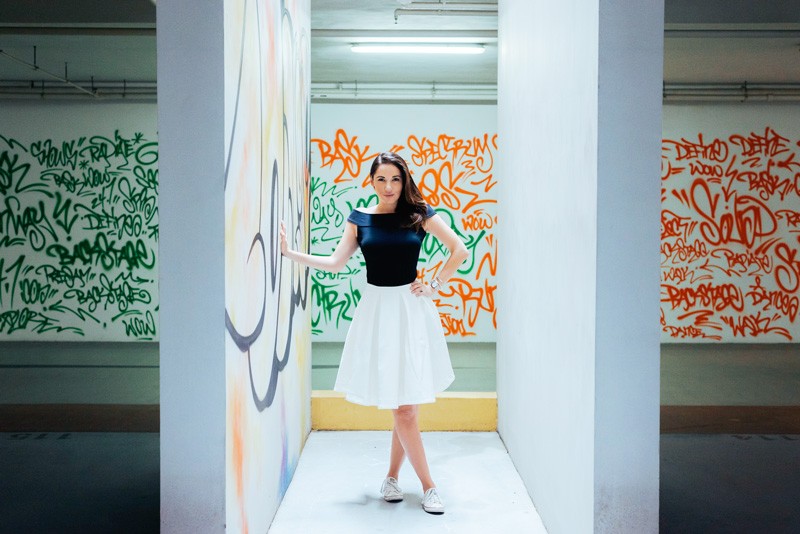Katherina-Olivia Lacey: In Search of the Next Big Thing

Katherina-Olivia Lacey is disarmingly charming, warning us semi-seriously before the photoshoot that she will need extremely close guidance for her close-up. “You’ll have to tell me exactly what to do. Right down to my fingers, hands and feet”, she says, laughing. Watching this golden-skinned, curvy Venus work the camera, she's quite clearly a pro. She’s quick on the uptake, adjusting her poses swiftly to match our photographer’s directions, even as she narrows her densely-lashed, carefully mascara-ed eyes with a discreet downward tilt of the chin, to give her gaze extra intensity. What really catches my attention is a wry upward curl of her mouth, playing at the left-most corner of her closed-lipped smile. Judging by the impressive number of followers she’s garnered on social media, Katherina’s appeal is something clearly not just felt by me alone. Her Instagram account called “katherinaolivia”, sees a star-worthy 206k strong and growing follower count, pulling in healthy numbers of “likes” and adulatory comments from admirers around the world. With a vocal and enthusiastic legion of online admirers, it seems that Katherina has it made in a world where virtual “likes” and follower counts often translate to real life social and financial gains. These markers of success though, mean little to her. What Katherina is really interested in, is cracking the “science” behind what makes an Instagram account popular. Pretty pictures aside, her account is a carefully constructed social experiment to determine the factors and patterns that contribute to social media success. “I love everything to do with understanding how things work”, she tells me. “I’m not interested in the gimmicky. I want to solve something, create some type of value. Even if it is a 0.01% improvement, I’ll know that I didn’t create just for the fun of it. I want impact.” It would have been easy to dismiss Katherina as yet another snap-happy Instagrammer with a jet-setting lifestyle. But as I listen to her story of why she travelled avidly (27 countries in 2015 alone) while setting up her logistics company, and how she suffered a breakdown earlier this year, I realise she has more to offer than what’s on the surface. She is warm and personable, somehow both the girl-next-door and a savvy global citizen; a young lady who's founded a lucrative business amidst difficult conditions, while keeping a wide-eyed wonder and love for not only what she does, but also the world around her.
TEO REN FENG: You hold quite a bit of clout on Instagram.
KATHERINA-OLIVIA LACEY: I started my Instagram account because I love everything to do with understanding how things work, and I wanted to see what it was that people liked so much about it. People were just posting a bunch of pictures—why is it so different from Facebook? I also wanted to know if there were patterns or a theme to it.
REN FENG: How did you figure it out then?
KATHERINA: Well, I just snap a moment with me in it and note what works best. In spite of all the selfies you see on my account, I‘m not a vain person. I’ve tried posting pictures of my fiancée, but people didn’t want to see him! [laughs] Pictures of me were much better received.
If I posted pictures without much thought, I don’t think I would have that many followers.
REN FENG: So your selfies are part of an experiment?
KATHERINA: If I posted pictures without much thought, I don’t think I would have that many followers. I’ve treated this as a project. People are self-centred, especially on Instagram. For example, if they were visiting Barcelona, you’d think they would post a picture of the famous cathedral. But a majority don’t. They just take pictures of themselves barely showing the arc of a cathedral door to let everyone know that they are in Barcelona, without mentioning the cathedral. People aren’t interested in the cultural or architectural significance of a site.
REN FENG: You’re telling me that it’s really a platform for self-gratification.
KATHERINA: Instagram is also a way for people to live vicariously through others. People don’t want to see sad pictures. A lot of people who don’t take Instagram seriously will post pictures of their actual mood. They don’t consider if their content is engaging, and the thing is, people don’t care about the fact that you’re bored. What they want to know is that you are happy bored. So god forbid if you’re sad and crying because somebody dumped you. [laughs]
REN FENG: Does it get tiring?
KATHERINA: There are times that I’ve stopped posting on Instagram because it is exhausting. I don’t always look a particular way. I like going to the gym with no make-up on. I don’t want to be posing or posturing all the time. It is helpful as a distraction from work though. Looking at my account, it seems I’m always travelling to enjoy myself, but really, most of the places were for work. I just took pictures whenever I had some spare time.
REN FENG: So what is the secret to Instagram success?
KATHERINA: Instagram is based on consistency. It’s not about having 20 pictures of your dog, then 20 pictures of your cat, and then another 5 of your Lego set. You have to be consistent. I control what I post on my Instagram, and it seems to work. I know this guy with a travel blog and I look at his pictures to check out new places. I hope people look at mine as a point of reference.
REN FENG: Do you think your social media presence adds or detracts from you as a businesswoman?
KATHERINA: Funnily enough, in emerging markets, people don’t actually Google you—especially in my industry. [laughs] That said, I try to keep my work and personal accounts very separate. My Facebook is my most private account, where I make my personal announcements like my recent engagement. You would never see that on my Instagram.
REN FENG: You seem to enjoy knowing things, having situations figured out, and being in control. Are you comfortable with failure then?
My real problem is a lack of patience.
KATHERINA: Failure. Oh my god . . . [laughs] My real problem is a lack of patience. I’m really not a patient person. So waiting to know if I was going to fail or succeed with Quincus drove me a little bit crazy.
REN FENG: How long were you wondering for?
KATHERINA: Unfortunately our start-up went through different stages, which meant a lot of waiting in-between. The first part was the time spent figuring out if we could actually build the technology for our business. Then there was the fundraising, which became exhausting as Brazil’s economy turned sour, and people became much more cautious when investing. It was difficult for us as a start-up with limited proof of capability. So, there was a lot of time spent trying and waiting, until eventually, we decided that the best thing to do would be to go for an acquisition. So we’re selling our technology, which is more advanced than our competitors, even here in Asia, and closing off our businesses.
REN FENG: When will the details of this acquisition be public knowledge?
KATHERINA: Probably next year, in January or February. Until the money is fully in the bank, then I can rest a little easier. I’ve been screwed over. I’ve had investors say to me: “Yes, I will invest in you. I’ve committed X amount”, but back out at the last minute.
REN FENG: Tell me about more about Quincus.
KATHERINA: We focus on B2B, optimising the way deliveries are done, and how a vehicle travels. Instead of point-to-point, we did multi-stop routing and filled up otherwise empty vehicles. Our drivers would be constantly moving “warehouses”, just transporting all over the city. It’s a constant flow on a circuit.
REN FENG: What gave you the idea?
KATHERINA: I used to work in a B2B company manufacturing swimwear. Getting out garments on time was crucial because other businesses relied on it. The delivery system was problematic because pick-up would be at 5 o’clock every day. If we were not ready, the truck would just leave and we would have to wait for the next day. Also sometimes, if somebody wanted a delivery nearby, we wouldn’t be able to do that immediately due to the fixed pick-up time. It’s a problem a lot of small businesses deal with, where you can’t simply call for a courier or delivery boy because of the size and quantity of your wares. By having drivers that are always on-the-go, we didn’t need to designate a fixed schedule and could always send over another pick-up at any time. Returns made don’t even count, since it becomes part of a journey.
REN FENG: Why did you launch in Brazil?
KATHERINA: We wanted to enter a transportation market that was fragmented, but with enough movement happening at the same time. We also wanted to stress-test our technology and to make sure that it could run well, anywhere. Brazil was perfect because traffic jams in São Paolo are so bad that you have to turn off the engine and wait. This is also why we expanded to Jakarta, since their traffic jams are notorious as well. By testing our technology in South America and Asia, its effectiveness becomes truly universal.
REN FENG: How did you get customers to be interested in your platform?
KATHERINA: When we began, like most start-ups, we thought: “Let’s embrace every customer, every customer counts.” But you soon realise that you also need quality over quantity. As a tech start-up, we needed to test our product, repeatedly. It was selfish, but we were trying to build something amazing—and you need forgiving customers who understand that you’re just starting out. You can’t have those who keep giving you a shit-storm every time something goes wrong.
REN FENG: Was there any situation for example, where there was a mess-up, or if the customer was so difficult that you actually had to. . .
KATHERINA: Fire them?
REN FENG: You’ve fired customers?
KATHERINA: There are good customers and horribles ones too. And I have no problems firing them. I think it’s healthy for a business, especially when you’re a small team. If certain customers are creating a bad feeling among employees, and you have to listen to complaints every day, at some point, you have to decide whether to pull the plug. I’ve done that once or twice.
REN FENG: What was the situation like?
KATHERINA: Our objective is to keep everything moving. When our drivers get to a pick-up location, it’s 20 minutes maximum and then they’re back on the road. We had one client though, who was never ready and would keep our driver waiting for a long time. We tried sending replacement drivers, though we didn’t have many, plus this particular company was way beyond our usual routes so we couldn’t avoid the tolls. We went out of our way for them, spending more than we earned, and everyone was exhausted with dealing with them that I decided it just wasn’t worth it. The thing is, they expected us to do that simply because they were a larger company.
REN FENG: Do you feel you need to be very aggressive and have a strong sense of individualism and conviction in order to run a business?
KATHERINA: Sometimes in this world, you have to be feisty—especially in logistics, which unfortunately has a totally old-school, chauvinistic mentality. I hold a lot of respect for people who see me as an equal.
REN FENG: How did you cope in a largely male-dominated field? Did you have to change your behaviour to a certain extent, or face discrimination?
KATHERINA: There were difficulties. I had some who would ignore me and talk to my co-founder [Jonathan Savoir], simply because he was a man. Or they would try to pick me up. It was very hard to find a middle ground. I didn’t change though. I wore dresses, didn’t care what people thought and said what was on my mind.
REN FENG: Regarding communication, how did you manage to keep the channels open and run your company with people separated by place or time zone?
KATHERINA: It’s hard. We had a small team in different locations, and developers based in India and the U.K. We spent a lot of time awake. Slack, Skype, e-mail... everything you can think of, we used it to communicate. This was done on a daily basis, regardless of where we were in the world. We were up at 5 a.m. every day for 2 years.
People look at my Instagram and think it’s all play and no work, but actually, 90% of my time is spent working and the other 10%, I’m freaking out about the work I’m not doing.
REN FENG: You’re always in someplace new. Does the travelling affect your work?
KATHERINA: It definitely affected the way my business is set up. We started in London, launched in Brazil, Mexico and Indonesia. I work best virtually though, so it’s easy for me to just plug in and work from anywhere. Also, when I’m immersed in new cultures and among new people, I get to see things from a different perspective, which helps. People look at my Instagram and think it’s all play and no work, but actually, 90% of my time is spent working and the other 10%, I’m freaking out about the work I’m not doing. [laughs]
REN FENG: You spent your childhood travelling and living in different parts of Europe and the Americas. Does your background make a difference in running your business and interacting with international clients?
KATHERINA: I guess I can click more easily with people. People have expectations and if they associate you with being an American, that’s it. You’re American. I am from Bolivia, so people would often be like, “Where the hell is that?” [laughs] Actually, that has helped me get along with a lot of people, because when you don’t fit into a particular box, people allow you the freedom to move in the space outside of it.
REN FENG: They can’t peg you.
KATHERINA: Yes, exactly. And because I travelled so much, my internationalism just grew with me, so I have varied and different personas. I can bond with most people over one thing, based on their culture, or my understanding of their culture. You’re also much more understanding as an international person.
REN FENG: Ideally, what sort of business would you love to start?
KATHERINA: I’m thinking of my next business right now, and I don’t know, to be honest. I’m not sure if I want to go into something out of interest.
REN FENG: Are you looking to solve another problem?
KATHERINA: I don’t want the gimmicky—to do something just for the fun of it, without creating any real value. I want to solve something, even if it is just a 0.01% improvement or change. At least I will know there’s some impact.
There’s so much pressure on succeeding as an entrepreneur that it can break you after awhile.
REN FENG: Do you think you’ve achieved success with Quincus?
KATHERINA: No, there’s so much more that I could have done. For me, success is simply getting through the day. There’s so much pressure on succeeding as an entrepreneur that it can break you after awhile. If you’re pushing yourself every day, it becomes really hard when you don’t.
REN FENG: So, just one step at a time.
KATHERINA: Yes. If not baby steps, then crawling.
REN FENG: What was your scariest moment as an entrepreneur?
KATHERINA: Actually, just starting. It was so scary to make the leap of no longer having a boss or salaried living.
REN FENG: What was your solution?
KATHERINA: You close your eyes and jump. I reassured myself a lot by taking it one day at a time and not focusing on the future. I think that’s also why I travelled so much. I wanted the sensation of going somewhere because at the beginning, things move slowly; it’s like standing on tectonic plates, you don’t feel anything but suddenly, you’re way off from where you began. My other fear, which did happen, was having a breakdown.
REN FENG: Tell me more about your breakdown.
KATHERINA: It was from December 2015 till about February 2016. I can talk about it now, but if you had asked me about it 6 months ago, I’d be crying my eyes out. Simply put, I didn’t know who I was anymore. As an entrepreneur, you become a better person in so many different ways. You become stronger and it takes a lot more to put you down. It’s growth on hyper-speed, a fast-forward, but at the same time, you can get consumed by it. I loved it. It was a high—every day was a high, but that can become a little too much.
REN FENG: You lost perspective?
KATHERINA: I had become so self-centred and selfish because I was so focused on my business. It got to a stage where I wasn’t being the best person that I could possibly be, especially with my team. I just got up and left them. It’s so funny, because I‘m that person who’s always so impatient, but I realised I had run too hard and too far in my hurry.
REN FENG: What would you change the next time around?
KATHERINA: Well, I wouldn’t put so much pressure on myself. And by that, I mean your business is not just about you. There are so many other people contributing to it and that’s what I forgot.
REN FENG: Has being an entrepreneur made you a better person?
KATHERINA: Well, I’m more patient now. [laughs]
REN FENG: Finally, what advice would you give to other entrepreneurs who are starting out?
KATHERINA: First, I’d slap some reality into them. A lot of people start businesses thinking it’s so cool to have your own business, but it’s not. It is the uncoolest thing to have so much responsibility. Second, don’t be afraid to travel when you have a business. I found it very refreshing. It was also a good test of our teams’ strengths and weaknesses, and if our various offices could still run on their own without us being around. Third, surround yourself with smart people. I don’t care where you have to find them, find smart people. Never be the smartest one in a room. You should be the somewhere in the middle though, you don’t want to be the stupidest.
****
Edited by Wy-Lene Yap





